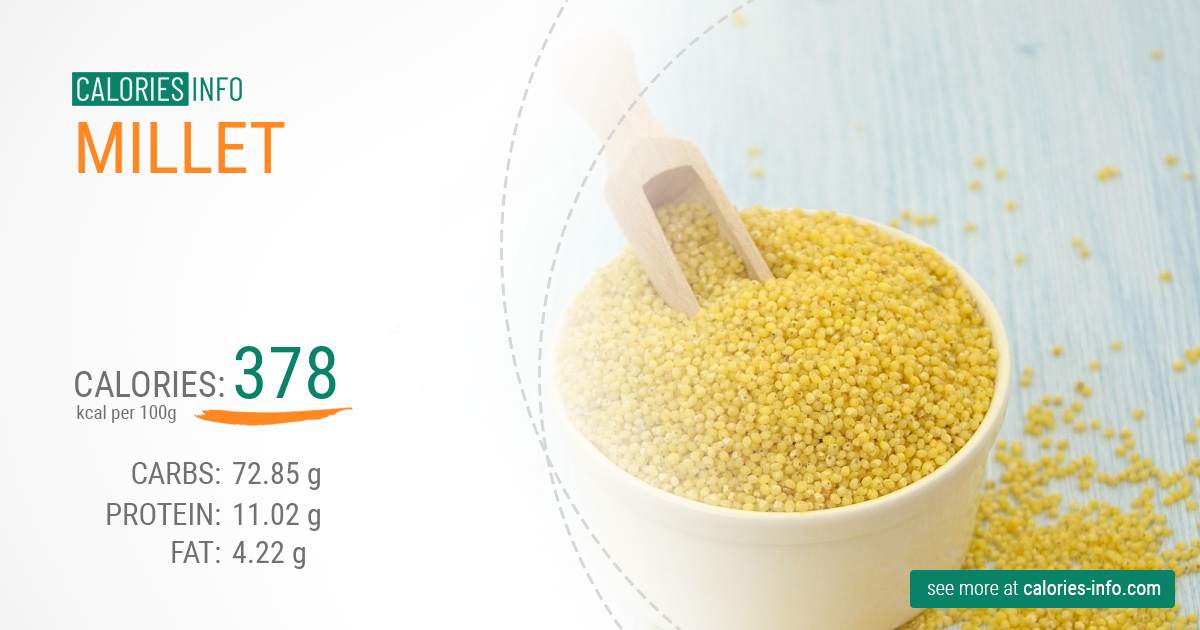Millet: Calories and Nutrition Analyse
How many calories in millet?

Nutrition Facts
MilletServing size:
standard serving size of millet (86 g) change
5g10g15g20g30g40g50g60g80g100g120g140g160g180g200g220g250g300g350g400g450g500g600g700g800g900g1000g
1oz2oz3oz4oz5oz6oz7oz8oz10oz12oz15oz20oz25oz30oz35oz40oz50oz
Amount Per Serving:
100g of millet contain about 378 calories (kcal).
Calories per:
ounce
| standard serving size, tablespoon
| cup
| half cup
To show you what does it mean, a standard serving size of millet (86 g) contain about 325 calories.
This is about 16% of the daily caloric intake for an average adult with medium weight and activity level (assuming a 2000 kcal daily intake).
Scroll down for details and nutrition tables.
To visualize how much 325 kcal actually is, keep in mind that the calorie content of millet is similar to that of, for example:
- 6 apples
- 4 glasses of Coca Cola (220 ml glass)
- 3 slices of cheese
- 3 slices of bread
- 2.5 glasses of milk
- 17 cubes of sugar
Take a quick look at the tables below for detailed information about millet nutrition.
100g of Millet
Nutrition
- Calories378
- Carbs Total72.85 g
- Dietary fiber8.5 g
- Fat4.22 g
- Saturated fat0.6 g
- Protein11.02 g
- Water8.67 g
Vitamins
- Vit B1 (Thiamine)0.421 mg
- Vit B2 (riboflavin)0.29 mg
- Vit B3 (Niacin)4.72 mg
- Vit B60.384 mg
- Vit B9 (Folic acid)0.085 mcg
- Vit E0.05 mg
- Vit K0.001 mg
Minerals
- Potassium195 mg
- Phosphorus0.9 mg
- Magnessium114 mg
- Calcium8 mg
- Sodium5 mg
- Iron3.01 mg
- Zink0.9 mg
Discover the Nutritional Powerhouse: Millet
Often overshadowed by more common grains like wheat and rice, millet is a nutritional gem that deserves a spotlight in your diet. This ancient grain, with its origins dating back thousands of years, is not only packed with essential nutrients but is also a versatile ingredient that can be incorporated into various dishes. Let's dive into the nutritional profile of millet and uncover why it should be a staple in your meals.
Millet Calories and Nutritional Benefits
One serving of millet provides approximately 378 calories, making it a dense source of energy for your day-to-day activities. However, it's not just about the calories; millet is loaded with nutrients that contribute to its health benefits.
Protein in Millet
With 11.02 grams of protein per serving, millet is an excellent plant-based protein source. This makes it particularly appealing for vegetarians and vegans looking to diversify their protein intake beyond animal products.
Fat in Millet
Millet is low in fat, containing only 4.22 grams per serving, with a minimal 0.6 grams of saturated fat. This low-fat content, coupled with its high nutritional value, makes millet a heart-healthy choice.
Carbs in Millet
Carbohydrates are essential for energy, and millet provides a generous 72.85 grams, including 8.5 grams of dietary fiber. The high fiber content aids in digestion, helps in controlling blood sugar levels, and keeps you feeling full longer.
Vitamins and Minerals Galore
Millet is not just about macronutrients; it's also rich in essential vitamins and minerals. It boasts significant amounts of magnesium (114 mg), which is crucial for muscle function and bone health, and iron (3.01 mg), essential for blood production. Additionally, millet provides calcium, potassium, and zinc, along with vitamins B1, B2, B3, and B6, making it a nutritional powerhouse.
The Role of Millet in a Healthy Diet
Given its impressive nutritional profile, millet can play a vital role in a healthy diet. Its high fiber and protein content can help in weight management, while the low fat and absence of cholesterol contribute to heart health. Moreover, millet is gluten-free, making it a fantastic grain alternative for those with gluten sensitivities or celiac disease.
Incorporating millet into your diet is easy and versatile. It can be used as a substitute for rice or quinoa, added to soups and salads, or even used to make porridge, bread, and desserts. With its mild, slightly nutty flavor, millet complements a wide range of dishes, making it easy to enjoy its health benefits in your daily meals.
In conclusion, millet is a nutrient-dense grain that offers numerous health benefits. Its high protein, fiber, and essential vitamins and minerals make it an excellent addition to any diet. Whether you're looking to improve your heart health, manage your weight, or simply diversify your grain intake, millet is a choice worth considering.
How many calories are there in 1, 2, 3, or 5 servings of millet?
- Standard serving size of millet (86 g)325 kcal
- Tablespoon of millet (13g)49 kcal
- Cup of millet (174g)658 kcal
- Half cup of millet (87g)329 kcal
- Ounce (oz) of millet107 kcal
- Half of medium size servings of millet162.5 kcal
- Small size serving of millet (69g)260 kcal
- Big size millet (112g)422.5 kcal
- Two medium size servings of millet650 kcal
- Three medium size servings of millet975 kcal
- Four medium size servings of millet1300 kcal
- Five medium size servings of millet1625 kcal

Similar calories number have:
See also:
Read this:
- How many calories does beer have?
- Calories in a half of sharp cheddar cheese
- Calories in whole sharp cheddar cheese
- Calories for one, two or more sharp cheddar cheese
- Calories in tablespoon of sharp cheddar cheese
- How many carbs (carbohydrates) in sesame bagel?
- How much fat in Triscuits crackers?
- How much protein in long island iced tea?
- What is weight of soft serve ice cream?
- McDonalds Sundae Caramel calories per ounce (oz)
- Risotto calories per serving size



Add comment